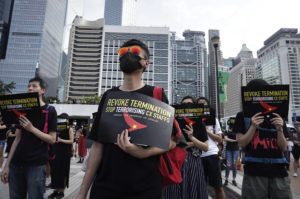The Department of Trade and Industry (DTI) and the Philippine Economic Zone Authority (Peza) are now at odds after the latter pushed for a proposal that would remove Peza from DTI’s jurisdiction.
But the proposal is more than just about Peza’s independence from the DTI. It will also amend the Peza law, giving the agency more power over its tax perks after clashing with the Duterte administration’s economic managers on the second tax reform package.
The proposal was filed in three separate but similar bills in the 18th Congress. Peza Director General Charito Plaza said they gave a copy of the proposal to Trade and Industry Secretary Ramon Lopez, who is Peza board chair.
Lopez had previously said that Peza pushed for the proposal despite his objection as chair of the board. Plaza claimed that Lopez was informed of the plan since the middle of last year.
“It is understood that from the very beginning, the trade secretary would not support the amendment to the Peza law. We never expected him to support the amendment, which will pave the way for us to be removed as an attached [government] agency [under] DTI,” she said.
She said the DTI “hears but does not listen” to Peza’s concerns on the second tax package, which will affect Peza and its registered industries—such as manufacturing and business process outsourcing—the most.
The tax package, which is now called the Comprehensive Income Tax and Incentive Rationalization Act (Citira), will lower the corporate income tax while rationalizing the tax incentives offered to select industries.
“The statements from Plaza does not have the endorsement of the board. And Peza’s position on the tax reform and the moves to propose a new Peza law are not officially endorsed,” Lopez replied when asked for his comments.
But despite the clash, both agencies actually want to amend the Citira bill to keep companies from downsizing or, worse, packing up and transferring elsewhere.
There are, however, glaring differences between DTI and Peza’s strategies. For example, Peza wants to keep the gross income earned tax perk, which companies pay in lieu of local and national taxes. But the Duterte administration does not want this perk since under current rules, this incentive can last forever, whereas the Department of Finance believes that tax incentives should be time-based.
“It’s actually Peza locators that we have been representing so that they can have a reasonable transition period, say extending the transition period from five to 10 years for existing locators,” Lopez said.
“This is to soften the landing for existing locators toward a time-bound and performance-based incentive, which are very rational economic principles that I believe in and must be understood by all government policymakers,” he said.
“The claim that the DTI secretary never showed support nor listened to the sentiments, issues and problems of industries are unfounded, totally not fair and uncalled for,” Lopez added.


